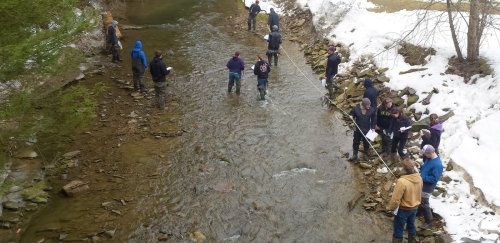
Hydrology (Minor)
Water — we often take it for granted. But in many parts of the U.S. and in numerous countries around the world, it is the most valuable natural resource.
- Degrees & Offerings
-
- Minor
- Location
-
- Bloomsburg
- Lock Haven
- Mansfield
- Program Contact
-
Associate Professor of Environmental, Geographical, and Geological Sciences
In order to use this precious resource wisely, we need to understand where it is, how it moves, and how our actions affect water quantity and quality. Hydrology is the science that can answer these questions and is broadly grouped into three major areas.
Surface Water: Many municipalities rely upon surface water — streams, rivers, and reservoirs — for their potable (drinking) water. Surface water hydrology is the study of streams, rivers, and reservoirs and their interplay with the local weather, climate, and groundwater. There are many grassroots organizations interested in maintaining the health of their local watershed — the area that supplies these sources. Two of our faculty are members of local organizations, and one is the group president. At BU, you will get an abundance of hands-on experience studying our local streams, and if you wish, plenty of volunteer opportunities to help clean them up.
Groundwater: Groundwater hydrology is the study of water below our feet. In our region, wells that tap groundwater are a common feature of many homes and farms. They supply drinking water and water for irrigation if rain is scarce in the growing season. In many parts of the U.S., wells are a critical resource for cities and towns that rely on groundwater for their drinking water. At Bloomsburg, you will learn the theory of groundwater, but you will also get field experience with wells we have here on campus.
Water Chemistry: Natural water is never pure — it always has small amounts of dissolved material. These give water its local flavor, and affect how it reacts with piping, machinery, and the human body! At BU, you can learn how to sample and analyze water from local wells, streams, and reservoirs.
Courses and Curriculum
Hydrology Minor Requirements
- 18+ credits required for minor completion
- Students should meet with their academic advisor each semester and use Degree Works to monitor their individual progress toward completion of the minor.
Students with a Hydrology Minor should:
- Demonstrate comprehension of basic principles in the primary areas of knowledge such as the identification and characterization of earth materials and the processes operating at or beneath the Earth's surface.
- Use relevant tools and instruments in a lab and/or field setting to collect geological data both on the surface and in the subsurface.
- Evaluate, analyze and interpret both quantitative and qualitative data for geological problem solving.
- Communicate graphically, orally and in writing.
Why Hydrology at CU?
Licensure and Certification
Hydrology has a professional certification and our minor is designed to help prepare you to sit for the Hydrology Fundamentals portion of the exam as a senior or new graduate. Even if you decide not to take the exam right away, the minor will help make you competitive when looking for your first job.
The Commonwealth Difference
Applying to This Program
Apply
-
Application Process
Review the step-by-step process whether you're a first-year student, transferring to CU, or more.
-
Apply Now
By starting your application, you gain access to your personalized application portal to view your progress.
-
Scholarships
As the largest comprehensive university in north central and northeastern Pennsylvania, CommonwealthU works hard to provide a world-class education that consistently rates among the best values in the nation.
Explore More
-
Explore Commonwealth University
There's no better way to learn more than to experience Commonwealth University for yourself! Set up a campus tour or connect with us virtually.
-
Connect with Your Admissions Counselor
Applying to college is a big step. You have questions, and we have answers!
-
Understanding Financial Aid
Financial Aid can be a complex topic. Our Financial Aid team is here to tell you what you need to know and help you navigate the financial aid process.

